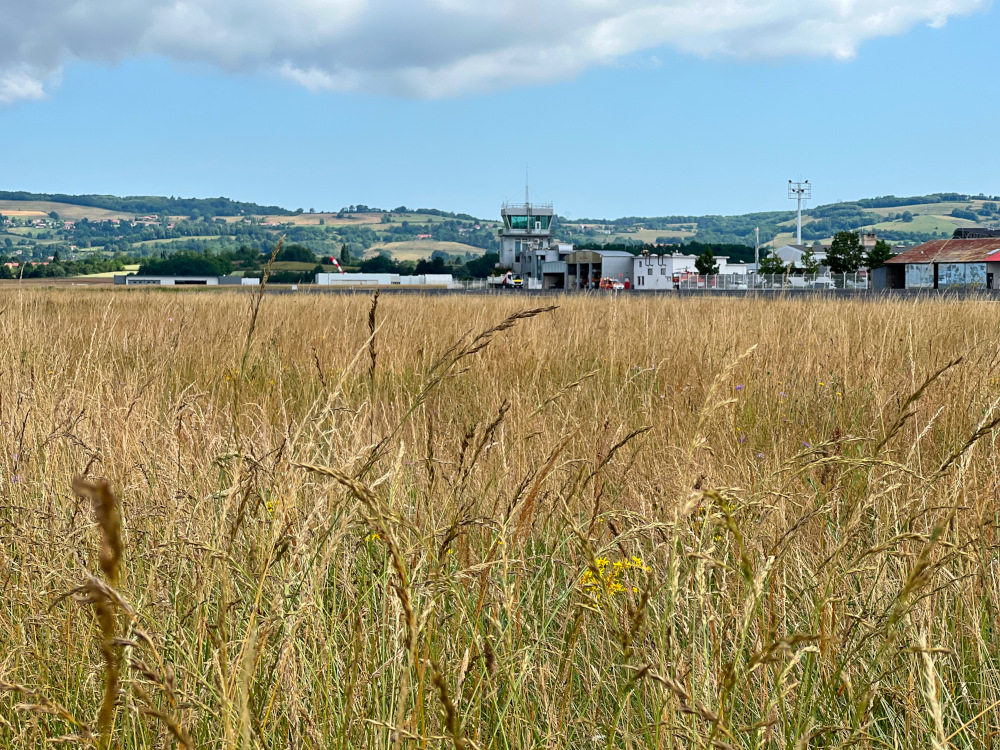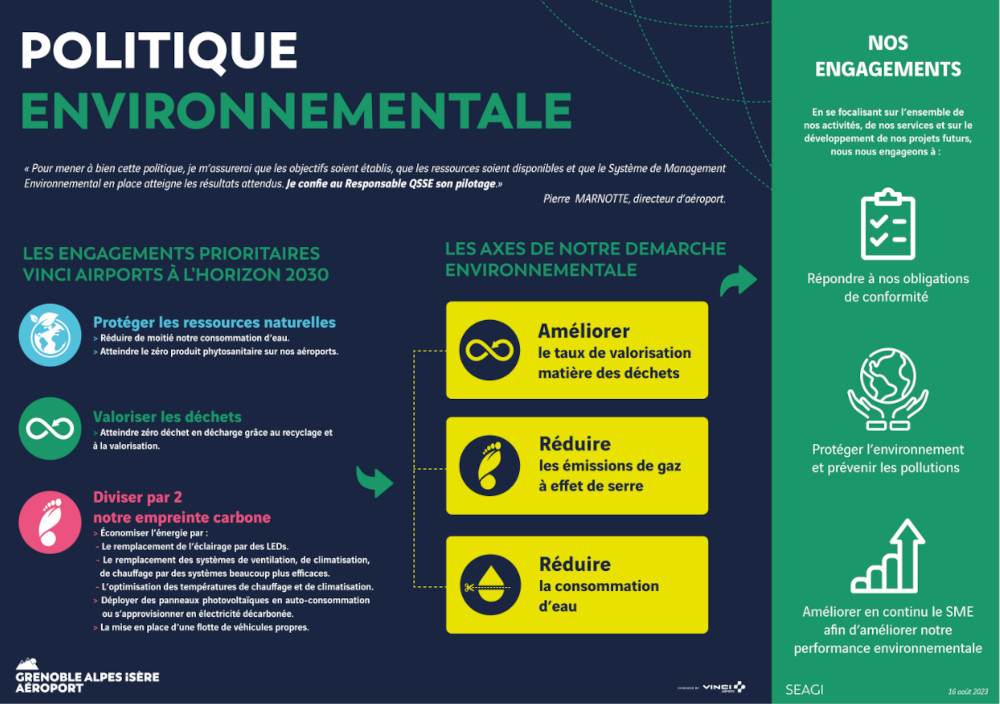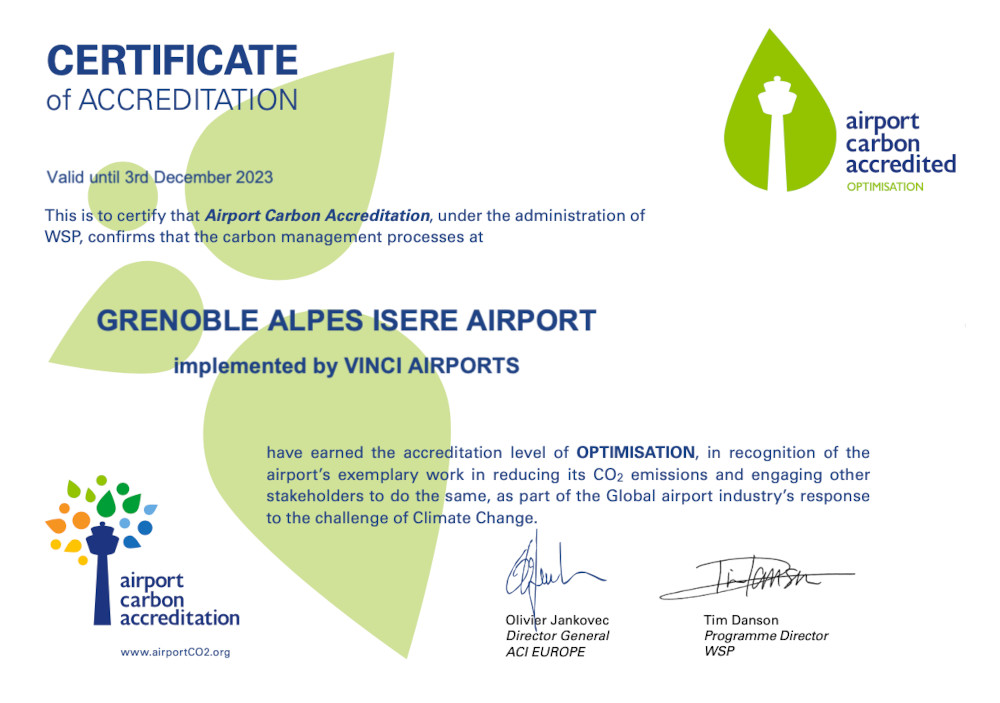- Home
- Environment
Environment

Find out here about the various commitments made and actions taken by Grenoble Airport and VINCI Airports to protect the environment and reduce carbon emissions.
L’Airport Carbon Accreditation (ACA)
irport Carbon Accreditation is the only institutional carbon management certification program for airports, with results that are subject to measurement. The voluntary ACA programme is run by Airport Council International (ACI). It recognises and accredits airport initiatives to manage and reduce carbon emissions, taking into account the site's operational activities, with a system of six levels of certification : Mapping, Reduction, Optimisation, Neutrality, Transformation and Transition.
In 2022, Grenoble Alpes Isère Airport obtained level 3 ACA certification, following on from its previous ACA certifications obtained since 2016.
This new accreditation is in line with the environmental policy implemented by VINCI Airports and rolled out across the network's airports (see below), and with the gradual decarbonisation of the Isère hub through a number of optimisations:
- Reducing electricity consumption by installing LED lighting in the aircraft car park, terminals and passenger car parks at the airport, and better management of lighting overall, such as switching off the passenger car parks at night.
- Extension of the electric vehicle fleet to include ramp and operating vehicles.
- Replacing the chiller system with the latest generation of energy-efficient equipment.
For more information, visit https://www.airportcarbonaccreditation.org/
ISO 14011 certificatio1
Since 2019, Grenoble Alpes Isère Airport has been ISO 14001 certified. The certification was last renewed in 2022.
Protecting biodiversity
As part of its commitment to protecting the environment, Grenoble Alpes Isère Airport has installed 3 beehives on site, in partnership with the Union nationale de l'apiculture française (UNAF). Every year, the honey produced by the bees is bottled and distributed to airport employees.
This attention to biodiversity is also reflected in the presence of a vegetable garden and an insect hotel on the airside, as well as the differentiated management of the green spaces, favouring late mowing to preserve the ecosystems present on site.
In addition, since 2020, Grenoble Alpes Isère Airport has been a partner of the French League for the Protection of Birds (LPO), whose teams come to carry out field studies, such as analysing bird nesting areas. The aim is to identify and preserve the various bird species present on the site. A wooded area is also under surveillance so that nearby birds can come and nest there.
Finally, preserving biodiversity also means disseminating knowledge and raising awareness among the general public and employees. With this in mind, a travelling exhibition on biodiversity, in particular the bird species present at the French airport sites in the VINCI Airports network (e.g. Skylark, Whimbrel, Goldfinch), was held at Grenoble Alpes Isère Airport between 2021 and 2022.

VINCI Airports’ commitments
As early as 2016, VINCI Airports initiated a proactive environmental approach across its entire network of airports worldwide and is a committed player in meeting the challenge of decarbonisation.
VINCI Airports' environmental policy focuses on three major areas :
- Reducing carbon emissions
- Saving energy
- Preserving biodiversity and natural resources
The ambition for 2030 :
- Actions to reduce our emissions within the scope of airport activities (energy-efficient renovation of infrastructure, LED relamping, electric runway equipment, etc.);
- Offsetting residual emissions through carbon sink projects;
- Halving water consumption;
- Achieving zero landfill waste through recycling and material recovery;
- Promoting and preserving biodiversity;
- Certify all airports ISO 14001.
This global and ambitious approach has already made it possible to reduce gross CO² emissions by 44% between 2018 and 2022.
The airport's environmental policy



